Natalie Zemon Davis (1928-2023)
A tribute by members of the History Community at Warwick
It is with much sadness that we have learned about the passing of Professor Natalie Zemon Davis on October 21, at the age of ninety-four. A Canadian-American, Professor Davis helped pioneer the genres of cultural and micro-history. Specialising in early modern period, she remained active in the field until her death, publishing a book in 2022 and nearly completing another in September of this year.[1] Over the course of her career, she received numerous accolades and prizes. In 2012, she was named Companion of the Order of Canada, and in 2013, she was honoured with a National Humanities Medal by President Barack Obama in 2013.
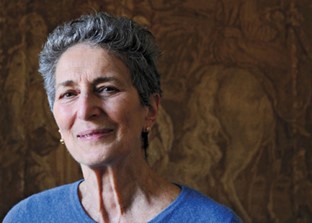
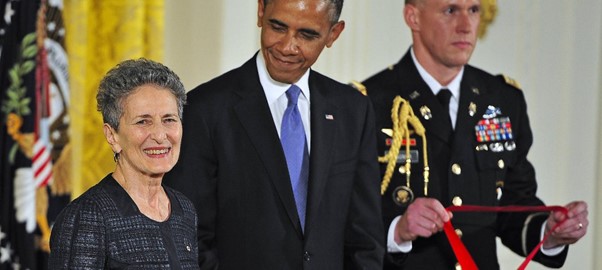
.

.
Davis’s first book, Society and Culture in Early Modern France: Eight Essays (1975), revolutionised the field. These essays, which still appear on syllabi to this day, combined social history ‘from below’ with interdisciplinary approaches to culture. They marked the beginning of Davis’s long engagement with cultural anthropology, notably, the works of Marcel Mauss, Arnold van Gennep, Claude Lévi-Strauss and Mary Douglas. But Davis pushed her use of anthropology in a post-structural direction: rather than fitting historical individuals into rigid social or semiotic systems, she explored how individuals mobilised social ties and cultural meanings to achieve their own ends. Like E. P. Thompson, a fervent admirer of her early work, she foregrounded the role of agency and experience in history. In a vibrant exchange of letters in the early 1970s, the two historians discussed their overlapping interest in early modern popular culture, particularly traditions of rough music and charivari.[2]
In her microhistories, Davis was drawn to the ‘extreme ordinary’ and the marginal. Through painstaking archival research, she reconstructed the trials, tribulations and tactics of ordinary individuals who found themselves caught up in exceptional circumstances. Her most famous book, The Return of Martin Guerre (1983), offered a micro-historical treatment of a legendary episode that shook a sixteenth-century village in Languedoc. It told the story of an impostor, Arnaud du Tilh, who arrived in the village pretending to be the long-missing Martin Guerre, who had left for war nearly a decade earlier. Davis had served as a consultant on the film adaptation of the story, released in 1982 and starring Gérard Depardieu, but she was irritated by the film’s male-centric focus. In her telling, Martin Guerre’s wife, Bertrande de Rols, played a key role in helping to conceal the true identity of Arnaud, the impostor whom she loved. De Rols deftly exploited the norms expected of her, until, that is, the real Martin Guerre showed up and put a tragic end to the happy charade. Davis’s account reveals the complex politics of peasant communities while celebrating the agency and resilience of individuals trying to find happiness amidst myriad constraints. It also demonstrates her informed use of intuition. Although she admired the ‘social-scientific’ approach of the Annales School, especially the work of Emmanuel Le Roy Ladurie, who was pivoting away from the school’s focus on the longue durée towards microhistory, Davis did not shy away from educated guesswork. Like Leopold von Ranke, she was keenly aware of the limits of archives – their gaps and silences – and believed that the historian must at times intuit.
.
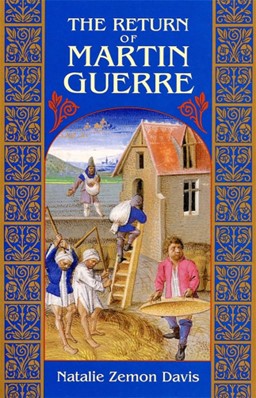
.
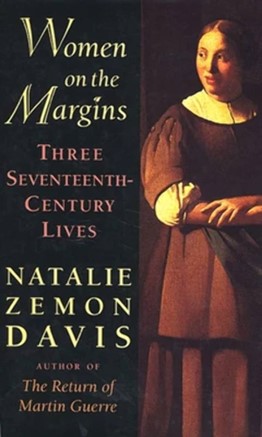
Like many historians in the 1980s, Davis partook in the ‘linguistic turn’. Drawing inspiration from literary theorists such as Hayden White and Roland Barthes, she became interested in how narratives structure how people understand events, fashion their identities and conceive of their place in society. But she did not venture as far down the linguistic path as other historians. Resisting the trend to dissolve agency and experience entirely into language, she insisted on maintaining conceptual space between language and individual agency. This concern was expressed in Fiction in the Archives: Pardon Tales and Their Tellers in Sixteenth-Century France (1987) – a book that analysed how criminals told stories about themselves in the hopes of receiving pardons or grace from the courts. The key to her approach is indicated by the subtitle: ‘pardon tales and their tellers’. While attending to narrative structures, Davis also considered interests, motivations and the variations with which people told stories. The book influenced other early modernists, who began paying attention to the ‘constructed’ but also strategic ways that accusers, defendants, witnesses, lawyers and chroniclers went about crafting ‘fictions’ to persuade various audiences.[3]
Davis’s later work took a global turn while remaining micro-historical. She explored how individuals around the world – men, women, young, old, Catholics, Protestants, Jews, Muslims, Native Americans and Africans – created lives for themselves while navigating cultural, gender and religious differences. Women on the Margins: Three Seventeenth-Century Lives (1995) offered three case studies of women – a Jew in Europe, a Catholic in Quebec, and a Protestant in Suriname – who worked hard to fulfil what they saw as their professional and familial obligations. Drawing on their religious faith and the resources available to them, they often managed to sidestep gender hierarchies. They also took a keen interest in observing the foreign cultures around them. Most importantly, for Davis, they embraced their marginality, for it was at the margins – a ‘borderland between cultural deposits’ – that ‘new growth and surprising hybrids’ were possible.[4]
Davis further developed the global dimensions of her analysis in the early 2000s. In Trickster Travels: A Sixteenth-Century Muslim between Worlds (2006), she pieced together the life of a Muslim diplomat from Morocco, al-Hassan al-Wazzan, who, after being captured on the Mediterranean, was brought to the Vatican where he converted to Catholicism and pursued scholarship under the Pope. Anticipating the turn to global micro-history, Davis showed how this diplomat and scholar drew from two sets of cultural resources – Muslim and African on the one hand, Christian and European on the other – ‘to survive, discover, write, make relationships and think about society and himself.’[5] Al-Hassan al-Wazzan may have been a prisoner, but he did not allow himself to be imprisoned by culture or religion. Rather, he turned them to his own ends.
Davis’s focus on how individuals in history have dealt with ‘difference’ was inspired by a deep ethical sense of the historian’s craft. As she saw it, history should try not only to analyse how contemporaries negotiated (or failed to negotiate) differences; it should also try to bridge the differences between the past and the present. In the spirit of Lucien Febvre (another historian of sixteenth-century France and co-founder of the Annales School in the 1920s), she called upon historians to understand, not judge, those seemingly strange individuals one finds in the archives. Rescuing them from obscurity and grasping their aspirations and limits in their own terms, as they lived them (a Rankean but also Thompsonian endeavour), was, for her, an exercise in moral empathy. Doing so reminds us of the confected nature of our own aspirations and constraints and sensitises us to the potential risks and rewards of trying to bridge our own differences today.
.
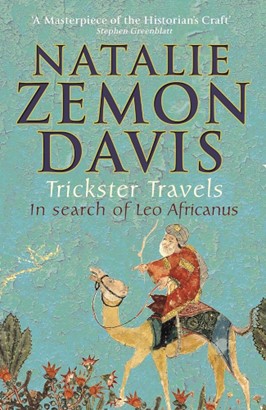
Davis was not naïve about the risks involved in bridging differences. Some of her work takes readers into deeply polarised worlds wracked by hatred and violence. Guided by her, these journeys into the dark areas of the past are never gratuitous or voyeuristic. They are instructive. After interpreting Catholic and Protestant forms of violence in sixteenth-century France as expressions of religious beliefs, she concluded: ‘if we try to increase safety and trust within a community, try to guarantee that the violence it generates will take less destructive and cruel forms, then we must think less about pacifying “deviants” and more about changing the central values.’[6] Done well, history can offer us insight into the sources of oppression and give hope in our capacity to reconcile differences.
Davis was an indefatigable and generous scholar. She supervised numerous PhD students throughout her career and was well-known for taking time to meet and correspond with scholars at all levels, including young scholars. The fact that she wrote a book on gift-giving reflects the person she was and conveys a sense of her moral worldview.
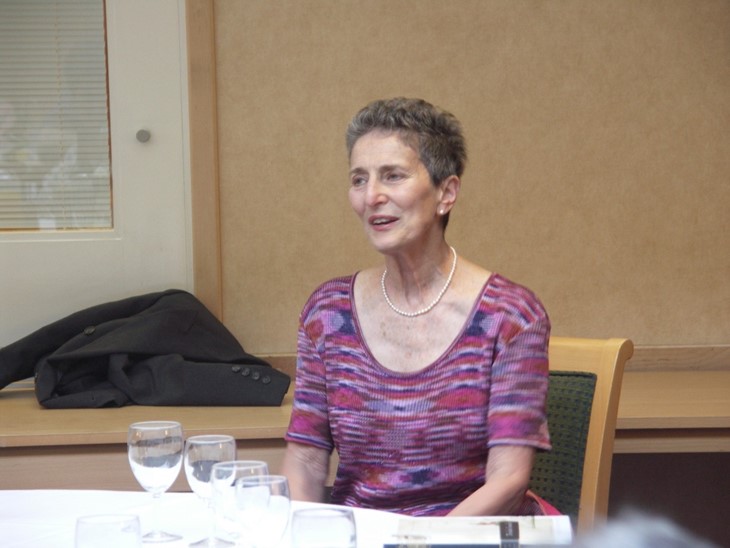
Natalie Zemon Davis at the University of Warwick, 2006.
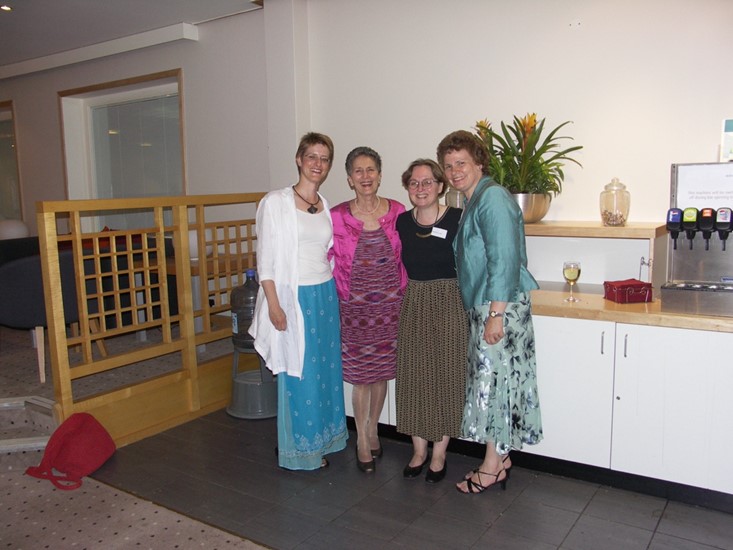
Natalie Zemon Davis with Anne Gerritsen, Margot Finn and Maxine Berg, 2006.
.
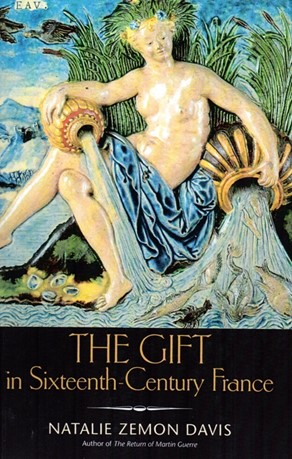
Davis had strong ties with the History Department at the University of Warwick. She visited in 1994 during her year as an Eastman Professor at Balliol College in Oxford and engaged with papers given by Penny Roberts, Maria Luddy, Carolyn Steedman, Sarah Richardson and several PhD students. In 2006, thanks to the efforts of Maxine Berg, Margot Finn and others, Davis received an honorary degree from the university in recognition of her lifetime achievements. She contributed to a festschrift for Professor Berg in 2020 with a chapter titled ‘Leo Africanus Presents Africa to Europeans’.[7] Penny Roberts co-edited a special 2012 issue of Past & Present, ‘Ritual and Violence: Natalie Zemon Davis and Early Modern France’, which included articles by Roberts and Davis. The issue grew out of a 2008 conference marking Davis’s eightieth birthday. Charles Walton, who had the privilege of studying with her, continues to work on themes she introduced him to, specifically, reciprocity and obligation, which found skilful treatment in her The Gift in Sixteenth-Century France (2000).
Davis’s friendship and generosity will surely be missed. Her historical vision, however, will undoubtedly live on, inspiring future generations.
By Charles Walton
With the help of Maxine Berg, Anne Gerritsen, Naomi Pullin, Penny Roberts and Guido van Meersbergen.
Notes
[1] Natalie Zemon Davis, Listening to the Languages of the People: Lazare Sainéan on Romanian, Yiddish and French (Budapest: Central Europe University Press, 2022). In September 2023, Davis had nearly completed ‘Braided Histories’, a book about John Stedman and a plantation in Suriname.
[2] Alexandra Walsham, ‘Rough Music and Charivari: Letters Between Natalie Zemon Davis and Edward Thompson, 1970–1972’, Past & Present, volume 235, issue 1, May 2017, pp. 243–262, https://doi.org/10.1093/pastj/gtx027.
[3] For example, see Malcolm Gaskill, ‘Reporting Murder: Fiction in the Archives in Early Modern England’, Social History 23: 1 (1998).
[4] Natalie Zemon Davis, Women on the Margins: Three Seventeenth-Century Lives (Cambridge MA: Harvard University Press, 1995), p. 210.
[5] Natalie Zemon Davis, Trickster Travels: In Search of Leo Africanus (Hill and Wang, 2006), p. 14.
[6] Natalie Zemon Davis, ‘The Rites of Violence’, Society and Culture in Early Modern France (Stanford: Stanford University Press, 1975), p. 187.
[7] Kristine Bruland, Anne Gerritsen, Pat Hudson and Giorgio Riello (eds.), Reinventing the Economic History of Industrialisation (Montreal: McGill University Press, 2020), chap. 10.
